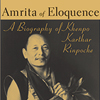
A luminous portrait of the life of Khenpo Karthar Rinpoche, one of the Kagyu lineage’s most beloved and revered teachers. Lama Karma Drodhul describes Khenpo Rinpoche and his life with lyrical beauty, devotion, affection, and humor. . .

Amrita of Eloquence: A Biography of Khenpo Karthar Rinpoche
by Lama Karma Drodhul, translated by Lama Yeshe Gyamtso,
foreword by the 17th Karmapa, Ogyen Trinley Dorje
KTD Publications 2008
ISBN: 978-1-934608-05-0
hardcover
5.5 x 8.5 in., 128 pages
Tibetan and English
$19.95
Amrita of Eloquence is beautifully written by Lama Karma Drodhul (Rinpoche’s nephew and disciple), and elegantly translated by Lama Yeshe Gyamtso, with a foreword by the 17th Gyalwang Karmapa, Ogyen Trinley Dorje, and prefaces by the Ninth Traleg Kyabgon Rinpoche and the Ninth Khenchen Thrangu Rinpoche. Originally composed by Lama Karma Drodhul at the request of the abbot of Thrangu Monastery, Lodroe Nyima Rinpoche, for Thrangu Monastery in East Tibet. Though it is composed in the traditional style of Tibetan spiritual biographies, it is nonetheless completely accessible to modern readers. The importance of such biographies cannot be overestimated: studying the life of one’s guru gives rise to spontaneous devotion and that leads to awakening.
Born in eastern Tibet in 1924, Khenpo Karthar Rinpoche is one of the great masters of the Karma Kagyu tradition. Rinpoche, who received most of his training and education in Tibet before the Chinese invasion, is highly accomplished in meditation, philosophy, and monastic arts. As abbot of Karma Triyana Dharmacakra Monastery (KTD) in Woodstock, New York; spiritual guide of thirty-five Karma Thegsum Choling (KTC) affiliate centers; and retreat master at the Karme Ling Retreat Center in Delhi, New York, Rinpoche has touched the lives of thousands of students. He is also known for numerous books, including The Quintessence of the Union of Mahamudra and Dzokchen; Dharma Paths; Instructions of Gampopa; Bardo: Interval of Possibility; The Wish-Fulfilling Wheel: The Practice of White Tara; and the five-volume masterwork Karma Chakme’s Mountain Dharma.
